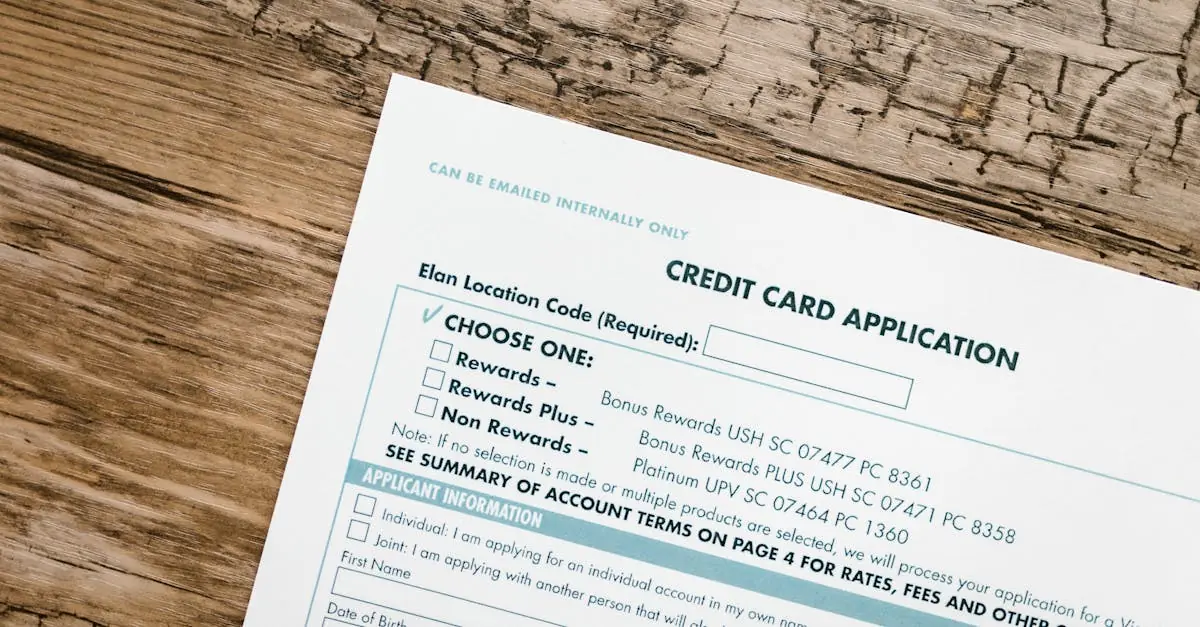Table of Contents
ToggleNavigating the VA loan application process might feel like trying to find a needle in a haystack while blindfolded. But fear not! With the right preparation, it can be as smooth as butter on a hot skillet. Veterans and active-duty service members deserve a home sweet home, and understanding the ins and outs of the VA loan can make that dream a reality.
Understanding VA Loans
VA loans serve as a vital resource for veterans and active-duty service members looking to buy homes. They offer significant benefits unique to military personnel. No down payment, competitive interest rates, and reduced closing costs make them appealing options for homebuyers.
Eligibility for VA loans involves specific criteria. Applicants must have served in the military, including the Army, Navy, Air Force, Marines, or Coast Guard. They must meet the length of service requirements and have received an honorable discharge. This ensures that only eligible veterans can access these benefits.
The application process for a VA loan requires documentation. Income verification, credit history, and service records are typical elements lenders assess. They prioritize credit scores, but VA loans are more flexible than conventional loans. Generally, a score of 620 or higher supports a smoother application process.
Understanding funding fees is essential for applicants. Most veterans pay a funding fee, which helps sustain the VA loan program. The fee typically ranges from 1.4% to 3.6% of the loan amount, depending on several factors, including the type of service. Certain exemptions exist for those with service-connected disabilities.
Many misconceptions surround VA loans. Some think these loans involve lengthy waiting periods or that they require perfect credit. In reality, VA loans enable quick closings and greater accessibility for veterans.
Educating oneself about VA loans significantly simplifies the home buying experience. Many resources, including VA websites and certified lenders, provide essential information. Professionals can offer guidance throughout the process, ensuring that applicants make informed decisions that align with their needs.
Eligibility Requirements
Understanding eligibility requirements is crucial for veterans and active-duty service members interested in VA loans. Various criteria determine who can qualify.
Service Requirements
Service members must meet specific service criteria to qualify for VA loans. They typically need at least 90 days of active duty during wartime or 181 days during peacetime. National Guard members and reservists often require six years of service unless called to active duty. An honorable discharge is essential for obtaining eligibility. Veterans with other discharge types may face additional hurdles. Documentation of service, such as a DD Form 214, often shows eligibility status. Meeting these service requirements enables individuals to access the benefits of VA loans.
Credit Score Considerations
Credit score influences the lending process for VA loans. While the Department of Veterans Affairs does not set a minimum credit score, lenders often recommend scores above 620. Higher scores generally facilitate better loan terms and interest rates. Maintaining good credit helps secure loan approval and lowers overall borrowing costs. VA loans are more flexible compared to conventional options, allowing for some lower scores in certain situations. Individuals should review their credit reports for errors before applying, ensuring a smoother application experience. Understanding credit implications helps borrowers prepare effectively for VA loan applications.
Gathering Necessary Documents
Preparation for a VA loan application necessitates gathering essential documents. Obtaining the right paperwork simplifies the process and bolsters the chances of a successful application.
Proof of Military Service
Verification of military service constitutes a crucial element of the application. Individuals must provide documentation, typically a DD Form 214, to establish eligibility. This document shows discharge status and periods of service. For those still serving, current military orders or a statement of service may suffice. Veterans and active-duty members alike must ensure that their provided documentation accurately reflects their service records.
Financial Documentation
Collecting financial documentation stands as a vital part of the application process. This includes recent pay stubs, W-2 forms, and tax returns from the last two years. Establishing a consistent income plays a significant role in the lender’s assessment. In addition to income verification, individuals should include bank statements to confirm assets and savings. Credit history also remains important; thus, obtaining a current credit report aids in identifying potential issues that may affect loan approval.
The Application Process
The VA loan application process consists of several key steps. Preparing documentation and understanding requirements are essential to success.
Completing the Loan Application
Completing the loan application begins with gathering necessary forms. Service members should ensure all personal information is accurate and up to date. The application typically requests details like income, employment history, and assets. It’s beneficial to have required documentation readily available, including Social Security numbers and details of any outstanding debts. Applicants submit this information to lenders who assess qualifications. Being thorough during this stage simplifies the process and reduces delays.
Working with Lenders
Working with lenders involves building a relationship to navigate the VA loan process. Selecting a lender experienced in VA loans is crucial, as they can provide tailored guidance. It’s important to communicate clearly about financial situations and any specific needs. Lenders often explain the funding fee structure, which varies based on service and down payment amounts. Maintaining open communication ensures that all questions are addressed promptly, streamlining the application experience. Moreover, finding a lender with favorable terms can significantly impact loan affordability and overall satisfaction.
Tips for a Successful Application
Preparing effectively increases the likelihood of a successful VA loan application. Understanding some critical aspects helps streamline the process.
Improving Your Credit Score
Improving one’s credit score plays a significant role in securing favorable loan terms. Review credit reports thoroughly for errors, as mistakes can negatively impact scores. Aim for a score above 620 to access better interest rates and loan options. Establishing timely payments also boosts these scores over time. Similarly, reducing credit card balances helps lower credit utilization ratios, which further enhances credit profiles. Lastly, avoid opening new lines of credit just before applying for the loan, as this can temporarily lower scores.
Debt-to-Income Ratio Management
Managing the debt-to-income (DTI) ratio is vital for loan approval. Lenders typically prefer a DTI ratio below 43%, although some flexibility exists with VA loans. Calculate monthly debts and the gross monthly income to determine the DTI ratio accurately. Reducing existing debt—such as credit card balances or personal loans—improves the ratio and strengthens the application. Additionally, increasing income through side jobs or promotions can also create a favorable DTI situation. Maintaining clarity in financial situations during discussions with lenders aids in making informed decisions about the loan process.
Conclusion
Preparing for a VA loan application can seem daunting but with the right approach it becomes a straightforward process. By gathering necessary documents and understanding eligibility criteria veterans and service members can navigate the application smoothly.
Working with knowledgeable lenders who specialize in VA loans can provide valuable insights and support throughout the journey. Taking proactive steps to improve credit scores and manage debt will further enhance the chances of a successful application.
Ultimately the VA loan program offers an incredible opportunity for those who have served to achieve their homeownership dreams. With careful preparation and informed decisions it’s possible to turn those dreams into reality.







